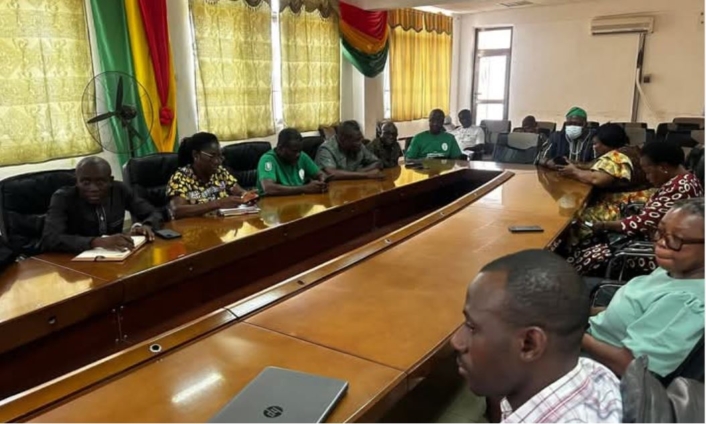
Audio By Carbonatix
The Acting Director General of the Ghana Health Service (GHS), Professor Samuel Kaba Akoriyea, has urged stakeholders in the Upper East Region to be vigilant and increase surveillance for Cerebro Spinal Meningitis (CSM).
He called for intensified awareness creation among residents to ensure that they are abreast with the signs, symptoms and precautionary measures to help in the prevention of the spread of the disease and early detection for timely treatment.
Professor Akoriyea made the call during an engagement with the Upper East Regional Coordinating Council in Bolgatanga as part of a working visit to the region since his assumption into office earlier this year.
In the early part of 2025, the country recorded its meningitis cases in the Upper West Region, and as of February, 16 persons had lost their lives to the disease out of the total 173 suspected cases.
Additionally, in the Upper East Region, two persons out of 31 suspected meningitis cases died, although the region has not recorded a meningitis outbreak.
The Director General noted that although the meningitis situation was under control, the situation was not over, and it was imperative for stakeholders in the health sector, especially in the two regions (Upper West Region and Upper East Region), to be cautious and vigilant to prevent its spread.
He expressed concern over people’s failure to visit the health facilities for treatment when experiencing the signs and symptoms but assured the public that GHS had procured enough vaccines to contain the situation.
Professor Akoriyea stressed the need for robust surveillance at the country’s borders and entry points, adding that the diseases could infiltrate into the country from the Sahelian countries due to proximity.
The Director General decried the shortage of health workers in the Upper East Region, attributing it to staff refusing postings to the area due to insecurity, particularly in conflict-prone areas like Bawku.
“Without peace, health indicators will not improve,” he stated, emphasising that safety concerns deter professionals from working in the region.
He also criticised interference in staff transfers by influential figures, calling for support to ensure equitable distribution of health workers.
Speaking on behalf of Mr Donatus Atanga Akamugri, the Upper East Regional Minister, Al-Hassan Ibrahim Abdul-Kadir, the Acting Regional Coordinating Director, acknowledged the concerns raised by the Director General, pledging to address them with the Regional Minister.
He noted that there are ongoing efforts and collaboration with the Ghana Medical Association to enhance security for health workers in the Region.
Latest Stories
-
Some OMCs reduce fuel prices; petrol going for GH¢10.86, diesel GH¢11.96
46 minutes -
Trump says health is ‘perfect’ amid ageing concerns
1 hour -
China’s BYD set to overtake Tesla as world’s top EV seller
1 hour -
Joy FM’s iconic 90’s Jam returns tonight: Bigger, better, and packed with nostalgia
2 hours -
Uproar as UG fees skyrocket by over 25% for 2025/2026 academic year
3 hours -
Japan PM joins fight for more female toilets in parliament
4 hours -
Ga Mantse declares war on fishing industry child labour
4 hours -
Adom FM’s ‘Strictly Highlife’ lights up La Palm with rhythm and nostalgia in unforgettable experience
5 hours -
OMCs slash fuel prices as cedi gains
7 hours -
Around 40 dead in Swiss ski resort bar fire, police say
7 hours -
AFCON 2025: Aubameyang and Nsue make history among oldest goalscorers
8 hours -
AFCON 2025: How Kwesi Appiah’s Sudan qualified for round of 16 without scoring any goal
9 hours -
Ghana is rising again – Mahama declares
9 hours -
Firefighters subdue blaze at Accra’s Tudu, officials warn of busy fire season ahead
10 hours -
Luv FM’s Family Party In The Park ends in grand style at Rattray park
10 hours

